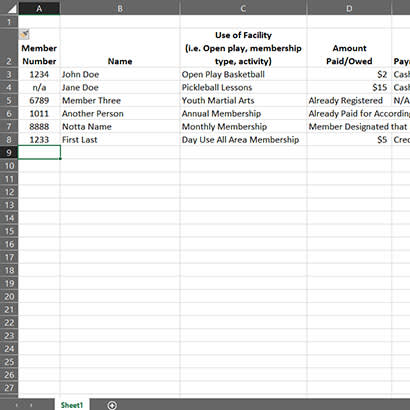
Keeping your agency operating smoothly during a system shutdown
It is a normal day; attendance at the recreation facility remains steady. But as the next member walks through the main entrance, ready to check in for a recreational activity, the unthinkable happens. The computer monitor appears to be loading at an incredibly slow rate, until suddenly, the screen displays a horrifying message: “Server Error.” Without warning, the recreation software stops working and the staff member running the system becomes frantic, unsure what steps to take.
This is not just any type of software; it is the command center for the entire park and recreation department. The technology holds the recreation facility’s most precious information, generates crucial reports, processes transactions, stores program information, and for some departments, hosts their website and its functions.
A Contingency Plan
Park and recreation professionals depend on the convenience of using computers and other technologies for most work tasks. Several professionals may not even use pen and paper for much of their career. Typically, we assume that this complex and crucial technology will work without a malfunction. With the ability to hold mini-computers in our pockets and the availability of many other technologies in every aspect of our lives, we forget how far we have come from a not-so-distant past.
For many workplace operations, technology has changed everything. Communication has become faster through email and the use of smartphones, documents have become easily accessible on computer hard drives and clouds, and marketing tactics have gone digital through websites and social media outlets. In August 2019, a major server outage at a software company affected many park and recreation agencies nationwide. This continued for approximately 12 hours, leaving many agencies in the dark. In numerous instances, criminal groups have hacked government agencies and caused their servers to crash. What if something happened to your agency’s technologies? Are your administration and front-line staff prepared?
When developing a program or hosting an event, park and recreation staff prepare plans B, C and D to respond to unanticipated circumstances. The same needs to be thought of regarding technology and its impact on daily operations. If the department requires daily admission reports, how would your staff track attendance? If the facility is a “pay-to-play” location, how would you successfully process both cash and credit card transactions?
All park and recreation departments need to have a plan for when technology fails. The following gives recommendations on how to recover when technology stops working for a recreational facility.
Hardcopy Backup — The most important priority is to keep operations running as smoothly as possible. If planned and executed correctly, members should have no idea that a technology failure has happened. For unresponsive software, use a spreadsheet program like Microsoft Excel. This amazing instrument can be used to record basic information like participant names and membership numbers, document the purpose of facility use, note payment type and mark participant attendance. If all systems are down, use a pen and paper check-in sheet. Make sure to create this predetermined system to record the key information and ensure all staff can access it.
After recovering the check-in process, the next priority is to ensure function of the registration and payment process. If the agency uses digital registration for programs and memberships, then registration forms may need to be created, preferably before a system malfunction occurs. These forms should match closely the information captured by the department’s recreation software. Be sure to capture the name of the program(s) and/or membership(s) that participants register for and include all required waivers. Proper financial recordkeeping is extremely important in this situation.
In a “pay-to-play” facility, staff should never let anyone participate without paying the proper admission or registration fee. Payment methods may be indicated as a continuation of the admission spreadsheet, but credit card forms that collect all information required by the software need to be created to allow the agencies’ merchant to process successful transactions after the software comes back online. Staff should ensure document privacy and destruction after completion of document use.
Phone-Call Response — Once the facility and departments are running efficiently, the departments should post on the departmental websites and social media outlets to inform the community of the unforeseen circumstances and apologize for any inconvenience of the registration process. If the recreation software is down, that also means prospective program participants are unable to register online. This may increase the number of phone calls a department will receive. When speaking with frustrated patrons, remember to be polite, vaguely explain the situation and apologize for the inconvenience. Although they may already be aware, get in touch with the software company’s support team or the agency’s IT department to ensure that the incident is not an isolated occurrence.
Paper to Digital — When systems are back to their usual operation, staff should use the provided tools to create new user accounts, perform registration processes, including transactions, and check in all participants. It is important that all the information is as accurate as possible. Managerial staff will need to save all documents in an easy-to-access file and destroy fiscally sensitive documents.
While agencies operate differently, a well-developed plan and easy-to-locate resources can ensure nothing stops a facility from functioning at its normal operational capacity. No agency should ever decide to close its recreation facilities because of technical issues. Recreation facilities were able to operate long before computers made regular tasks easier. If the facility can operate safely under close-to-usual conditions, then the recovery time will be reduced significantly. The odds of technology failing are slim, but if it happens, be sure your department is ready.
Hunter Pooser is the Recreation Specialist for City of Marietta Parks, Recreation and Facilities.

